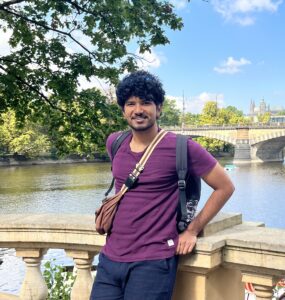2026
|
Biedenkapp, André Contextual Intelligence: The Next Leap for Reinforcement Learning Inproceedings Forthcoming In: Amato, C.; Dennis, L.; Mascardi, V.; Thangarajah, J. (Ed.): Proceedings of the 25th International Conference on Autonomous Agents and Multiagent Systems, AAMAS 2026, Blue Sky Ideas Track., Forthcoming. @inproceedings{biedenkapp-aamas26a,
title = {Contextual Intelligence: The Next Leap for Reinforcement Learning},
author = {André Biedenkapp},
editor = {C. Amato and L. Dennis and V. Mascardi and J. Thangarajah },
year = {2026},
booktitle = {Proceedings of the 25th International Conference on Autonomous Agents and Multiagent Systems, AAMAS 2026, Blue Sky Ideas Track.},
keywords = {}
}
|
2025
|
Eimer, Theresa; Schäpermeier, Lennart; Biedenkapp, André; Tornede, Alexander; Kotthoff, Lars; Leyman, Pieter; Feurer, Matthias; Eggensperger, Katharina; Maile, Kaitlin; Tornede, Tanja; Kozak, Anna; Xue, Ke; Wever, Marcel; Baratchi, Mitra; Pulatov, Damir; Trautmann, Heike; Kashgarani, Haniye; Lindauer, Marius Best Practices For Empirical Meta-Algorithmic Research Guidelines from the COSEAL Research Network Journal Article In: arXiv:2512.16491 [cs.AI], 2025. @article{eimer-arxiv25m,
title = {Best Practices For Empirical Meta-Algorithmic Research Guidelines from the COSEAL Research Network},
author = {Theresa Eimer and Lennart Schäpermeier and André Biedenkapp and Alexander Tornede and Lars Kotthoff and Pieter Leyman and Matthias Feurer and Katharina Eggensperger and Kaitlin Maile and Tanja Tornede and Anna Kozak and Ke Xue and Marcel Wever and Mitra Baratchi and Damir Pulatov and Heike Trautmann and Haniye Kashgarani and Marius Lindauer},
year = {2025},
journal = {arXiv:2512.16491 [cs.AI]},
keywords = {}
}
|
Nguyen, Tài; Le, Phong; Biedenkapp, André; Doerr, Carola; Dang, Nguyen Deep Reinforcement Learning for Dynamic Algorithm Configuration: A Case Study on Optimizing OneMax with the (1+(λ,λ))-GA Journal Article In: arXiv:2512.03805 [cs.LG], 2025. @article{nguyen-arxiv25a,
title = {Deep Reinforcement Learning for Dynamic Algorithm Configuration: A Case Study on Optimizing OneMax with the (1+(λ,λ))-GA},
author = {Tài Nguyen and Phong Le and André Biedenkapp and Carola Doerr and Nguyen Dang},
year = {2025},
journal = {arXiv:2512.03805 [cs.LG]},
keywords = {}
}
|
Prasanna, Sai; Biedenkapp, André; Rajan, Raghu One Does Not Simply Estimate State: Comparing Model-based and Model-free Reinforcement Learning on the Partially Observable MordorHike Benchmark Inproceedings In: Eighteenth European Workshop on Reinforcement Learning, 2025. @inproceedings{prasanna-ewrl25a,
title = {One Does Not Simply Estimate State: Comparing Model-based and Model-free Reinforcement Learning on the Partially Observable MordorHike Benchmark},
author = {Sai Prasanna and André Biedenkapp and Raghu Rajan},
year = {2025},
booktitle = {Eighteenth European Workshop on Reinforcement Learning},
keywords = {}
}
|
Mohan, Aditya; Eimer, Theresa; Benjamins, Carolin; Lindauer, Marius; Biedenkapp, André Mighty: A Comprehensive Tool for studying Generalization, Meta-RL and AutoRL Inproceedings In: Eighteenth European Workshop on Reinforcement Learning, 2025. @inproceedings{mohan-ewrl25a,
title = {Mighty: A Comprehensive Tool for studying Generalization, Meta-RL and AutoRL},
author = {Aditya Mohan and Theresa Eimer and Carolin Benjamins and Marius Lindauer and André Biedenkapp},
year = {2025},
booktitle = {Eighteenth European Workshop on Reinforcement Learning},
keywords = {}
}
|
Nguyen, Tài; Le, Phong; Biedenkapp, André; Doerr, Carola; Dang, Nguyen On the Importance of Reward Design in Reinforcement Learning-based Dynamic Algorithm Configuration: A Case Study on OneMax with (1+(λ,λ))-GA Inproceedings In: Proceedings of the Genetic and Evolutionary Computation Conference (GECCO'25), 2025, (Won the best paper award in the L4EC track). @inproceedings{nguyen-gecco25a,
title = {On the Importance of Reward Design in Reinforcement Learning-based Dynamic Algorithm Configuration: A Case Study on OneMax with (1+(λ,λ))-GA},
author = {Tài Nguyen and Phong Le and André Biedenkapp and Carola Doerr and Nguyen Dang},
year = {2025},
booktitle = {Proceedings of the Genetic and Evolutionary Computation Conference (GECCO'25)},
journal = {arXiv:2502.20265 [cs.LG]},
keywords = {}
}
|
Shala, Gresa; Biedenkapp, André; Krack, Pierre; Walter, Florian; Grabocka, Josif Efficient Cross-Episode Meta-RL Inproceedings In: Proceedings of the Thirteenth International Conference on Learning Representations (ICLR'25), 2025. @inproceedings{shala-iclr25a,
title = {Efficient Cross-Episode Meta-RL},
author = {Gresa Shala and André Biedenkapp and Pierre Krack and Florian Walter and Josif Grabocka},
year = {2025},
booktitle = {Proceedings of the Thirteenth International Conference on Learning Representations (ICLR'25)},
keywords = {}
}
|
Fernandes, Rean; Biedenkapp, André; Hutter, Frank; Awad, Noor A Llama walks into the ’Bar’: Efficient Supervised Fine-Tuning for Legal Reasoning in the Multi-state Bar Exam Journal Article In: arXiv:2504.04945 [cs.LG], 2025. @article{fernandes-arxiv25a,
title = {A Llama walks into the ’Bar’: Efficient Supervised Fine-Tuning for Legal Reasoning in the Multi-state Bar Exam},
author = {Rean Fernandes and André Biedenkapp and Frank Hutter and Noor Awad},
year = {2025},
journal = {arXiv:2504.04945 [cs.LG]},
keywords = {}
}
|
Hog, Johannes; Rajan, Raghu; Biedenkapp, André; Awad, Noor; Hutter, Frank; Nguyen, Vu Meta-learning Population-based Methods for Reinforcement Learning Journal Article In: Transactions on Machine Learning Research, 2025, ISBN: 2835-8856. @article{hog-tmlr25a,
title = {Meta-learning Population-based Methods for Reinforcement Learning},
author = {Johannes Hog and Raghu Rajan and André Biedenkapp and Noor Awad and Frank Hutter and Vu Nguyen},
editor = {Mirco Mutti},
year = {2025},
isbn = {2835-8856},
journal = {Transactions on Machine Learning Research},
keywords = {}
}
|
2024
|
Ferreira, Fabio; Schlageter, Moreno; Rajan, Raghu; Biedenkapp, André; Hutter, Frank One-shot World Models Using a Transformer Trained on a Synthetic Prior Inproceedings In: NeurIPS 2024 Workshop on Open-World Agents, 2024. @inproceedings{ferreira-arxiv24a,
title = {One-shot World Models Using a Transformer Trained on a Synthetic Prior},
author = {Fabio Ferreira and Moreno Schlageter and Raghu Rajan and André Biedenkapp and Frank Hutter},
year = {2024},
booktitle = {NeurIPS 2024 Workshop on Open-World Agents},
journal = {arXiv:2409.14084 [cs.LG]},
keywords = {}
}
|
Ndir, Tidiane Camaret; Biedenkapp, André; Awad, Noor Inferring Behavior-Specific Context Improves Zero-Shot Generalization in Reinforcement Learning Inproceedings In: Seventeenth European Workshop on Reinforcement Learning, 2024. @inproceedings{ndir-ewrl24a,
title = {Inferring Behavior-Specific Context Improves Zero-Shot Generalization in Reinforcement Learning},
author = {Tidiane Camaret Ndir and André Biedenkapp and Noor Awad},
year = {2024},
booktitle = {Seventeenth European Workshop on Reinforcement Learning},
journal = {arXiv:2404.09521 [cs.LG]},
keywords = {}
}
|
Bordne, Philipp; Hasan, M. Asif; Bergman, Eddie; Awad, Noor; Biedenkapp, André CANDID DAC: Leveraging Coupled Action Dimensions with Importance Differences in DAC Inproceedings In: Proceedings of the Third International Conference on Automated Machine Learning (AutoML 2024), Workshop Track, 2024. @inproceedings{bordne-automlworkshop24a,
title = {CANDID DAC: Leveraging Coupled Action Dimensions with Importance Differences in DAC},
author = {Philipp Bordne and M. Asif Hasan and Eddie Bergman and Noor Awad and André Biedenkapp},
year = {2024},
booktitle = {Proceedings of the Third International Conference on Automated Machine Learning (AutoML 2024), Workshop Track},
journal = {arXiv:2407.05789 [cs.LG]},
keywords = {}
}
|
Shala, Gresa; Arango, Sebastian Pineda; Biedenkapp, André; Hutter, Frank; Grabocka, Josif HPO-RL-Bench: A Zero-Cost Benchmark for HPO in Reinforcement Learning Inproceedings In: Proceedings of the Third International Conference on Automated Machine Learning (AutoML 2024), ABCD Track, 2024, (Runner up for the best paper award). @inproceedings{shala-automl24a,
title = {HPO-RL-Bench: A Zero-Cost Benchmark for HPO in Reinforcement Learning},
author = {Gresa Shala and Sebastian Pineda Arango and André Biedenkapp and Frank Hutter and Josif Grabocka},
year = {2024},
booktitle = {Proceedings of the Third International Conference on Automated Machine Learning (AutoML 2024), ABCD Track},
keywords = {}
}
|
Prasanna, Sai; Farid, Karim; Rajan, Raghu; Biedenkapp, André Dreaming of Many Worlds: Learning Contextual World Models Aids Zero-Shot Generalization Journal Article In: Reinforcement Learning Journal, vol. 3, iss. 1, no. 1, pp. 1317–1350, 2024, ISBN: 979-8-218-41163-3. @article{prasanna-rlc24a,
title = {Dreaming of Many Worlds: Learning Contextual World Models Aids Zero-Shot Generalization},
author = {Sai Prasanna and Karim Farid and Raghu Rajan and André Biedenkapp},
year = {2024},
isbn = {979-8-218-41163-3},
booktitle = {Proceedings of the First Reinforcement Learning Conference (RLC’24)},
journal = {Reinforcement Learning Journal},
volume = {3},
number = {1},
pages = {1317–1350},
keywords = {}
}
|
Shala, Gresa; Biedenkapp, André; Grabocka, Josif Hierarchical Transformers are Efficient Meta-Reinforcement Learners Journal Article In: arXiv:2402.06402 [cs.LG], 2024. @article{shala-arxiv24a,
title = {Hierarchical Transformers are Efficient Meta-Reinforcement Learners},
author = {Gresa Shala and André Biedenkapp and Josif Grabocka},
year = {2024},
journal = {arXiv:2402.06402 [cs.LG]},
keywords = {}
}
|
2023
|
Rajan, Raghu; Diaz, Jessica Lizeth Borja; Guttikonda, Suresh; Ferreira, Fabio; Biedenkapp, André; von Hartz, Jan Ole; Hutter, Frank MDP Playground: An Analysis and Debug Testbed for Reinforcement Learning Journal Article In: Journal of Artificial Intelligence Research (JAIR), vol. 77, pp. 821-890, 2023. @article{rajan-jair23,
title = {MDP Playground: An Analysis and Debug Testbed for Reinforcement Learning},
author = {Raghu Rajan and Jessica Lizeth Borja Diaz and Suresh Guttikonda and Fabio Ferreira and André Biedenkapp and Jan Ole von Hartz and Frank Hutter},
doi = {10.1613/jair.1.14314},
year = {2023},
journal = {Journal of Artificial Intelligence Research (JAIR)},
volume = {77},
pages = {821-890},
keywords = {}
}
|
Benjamins, Carolin; Eimer, Theresa; Schubert, Frederik; Mohan, Aditya; Döhler, Sebastian; Biedenkapp, André; Rosenhan, Bodo; Hutter, Frank; Lindauer, Marius Contextualize Me - The Case for Context in Reinforcement Learning Journal Article In: Transactions on Machine Learning Research, 2023, ISBN: 2835-8856. @article{benjamins-tmlr23a,
title = {Contextualize Me - The Case for Context in Reinforcement Learning},
author = {Carolin Benjamins and Theresa Eimer and Frederik Schubert and Aditya Mohan and Sebastian Döhler and André Biedenkapp and Bodo Rosenhan and Frank Hutter and Marius Lindauer},
editor = {Adam M White},
year = {2023},
isbn = {2835-8856},
journal = {Transactions on Machine Learning Research},
keywords = {}
}
|
Shala, Gresa; Biedenkapp, André; Hutter, Frank; Grabocka, Josif Gray-Box Gaussian Processes for Automated Reinforcement Learning Inproceedings In: Eleventh International Conference on Learning Representations (ICLR'23), 2023. @inproceedings{shala-iclr23a,
title = {Gray-Box Gaussian Processes for Automated Reinforcement Learning},
author = {Gresa Shala and André Biedenkapp and Frank Hutter and Josif Grabocka},
year = {2023},
booktitle = {Eleventh International Conference on Learning Representations (ICLR'23)},
keywords = {}
}
|
2022
|
Shala, Gresa; Arango, Sebastian Pineda; Biedenkapp, André; Hutter, Frank; Grabocka, Josif AutoRL-Bench 1.0 Inproceedings In: Workshop on Meta-Learning (MetaLearn@NeurIPS'22), 2022. @inproceedings{shala-metalearn22a,
title = {AutoRL-Bench 1.0},
author = {Gresa Shala and Sebastian Pineda Arango and André Biedenkapp and Frank Hutter and Josif Grabocka},
year = {2022},
booktitle = {Workshop on Meta-Learning (MetaLearn@NeurIPS'22)},
keywords = {}
}
|
Shala, Gresa; Biedenkapp, André; Hutter, Frank; Grabocka, Josif Gray-Box Gaussian Processes for Automated Reinforcement Learning Inproceedings In: Workshop on Meta-Learning (MetaLearn@NeurIPS'22), 2022. @inproceedings{shala-metalearn22b,
title = {Gray-Box Gaussian Processes for Automated Reinforcement Learning},
author = {Gresa Shala and André Biedenkapp and Frank Hutter and Josif Grabocka},
year = {2022},
booktitle = {Workshop on Meta-Learning (MetaLearn@NeurIPS'22)},
keywords = {}
}
|
Biedenkapp, André Dynamic Algorithm Configuration by Reinforcement Learning PhD Thesis University of Freiburg, Department of Computer Science, 2022. @phdthesis{biedenkapp22,
title = {Dynamic Algorithm Configuration by Reinforcement Learning},
author = {André Biedenkapp},
year = {2022},
address = {Freiburg, Germany},
school = {University of Freiburg, Department of Computer Science},
keywords = {}
}
|
Sass, René; Bergman, Eddie; Biedenkapp, André; Hutter, Frank; Lindauer, Marius DeepCAVE: An Interactive Analysis Tool for Automated Machine Learning Inproceedings In: Workshop on Adaptive Experimental Design and Active Learning in the Real World (ReALML@ICML'22), 2022. @inproceedings{sass-arxiv22,
title = {DeepCAVE: An Interactive Analysis Tool for Automated Machine Learning},
author = {René Sass and Eddie Bergman and André Biedenkapp and Frank Hutter and Marius Lindauer},
year = {2022},
booktitle = {Workshop on Adaptive Experimental Design and Active Learning in the Real World (ReALML@ICML'22)},
journal = {arXiv:2206.03493 [cs.LG]},
keywords = {}
}
|
Biedenkapp, André; Dang, Nguyen; Krejca, Martin S.; Hutter, Frank; Doerr, Carola Theory-inspired Parameter Control Benchmarks for Dynamic Algorithm Configuration Inproceedings In: Proceedings of the Genetic and Evolutionary Computation Conference (GECCO'22), 2022, (Won the best paper award in the GECH track). @inproceedings{biedenkapp-gecco22a,
title = {Theory-inspired Parameter Control Benchmarks for Dynamic Algorithm Configuration},
author = {André Biedenkapp and Nguyen Dang and Martin S. Krejca and Frank Hutter and Carola Doerr},
year = {2022},
booktitle = {Proceedings of the Genetic and Evolutionary Computation Conference (GECCO'22)},
journal = {arXiv:2202.03259},
keywords = {}
}
|
Biedenkapp, André; Speck, David; Sievers, Silvan; Hutter, Frank; Lindauer, Marius; Seipp, Jendrik Learning Domain-Independent Policies for Open List Selection Inproceedings In: Workshop on Bridging the Gap Between AI Planning and Reinforcement Learning (PRL @ ICAPS'22), 2022. @inproceedings{biedenkapp-prl22a,
title = {Learning Domain-Independent Policies for Open List Selection},
author = {André Biedenkapp and David Speck and Silvan Sievers and Frank Hutter and Marius Lindauer and Jendrik Seipp},
year = {2022},
booktitle = {Workshop on Bridging the Gap Between AI Planning and Reinforcement Learning (PRL @ ICAPS'22)},
keywords = {}
}
|
Parker-Holder, Jack; Rajan, Raghu; Song, Xingyou; Biedenkapp, André; Miao, Yingjie; Eimer, Theresa; Zhang, Baohe; Nguyen, Vu; Calandra, Roberto; Faust, Aleksandra; Hutter, Frank; Lindauer, Marius Automated Reinforcement Learning (AutoRL): A Survey and Open Problems Journal Article In: Journal of Artificial Intelligence Research (JAIR), vol. 74, pp. 517-568, 2022. @article{parker-holder-jair22a,
title = {Automated Reinforcement Learning (AutoRL): A Survey and Open Problems},
author = {Jack Parker-Holder and Raghu Rajan and Xingyou Song and André Biedenkapp and Yingjie Miao and Theresa Eimer and Baohe Zhang and Vu Nguyen and Roberto Calandra and Aleksandra Faust and Frank Hutter and Marius Lindauer},
year = {2022},
journal = {Journal of Artificial Intelligence Research (JAIR)},
volume = {74},
pages = {517-568},
keywords = {}
}
|
Benjamins, Carolin; Eimer, Theresa; Schubert, Frederik; Mohan, Aditya; Biedenkapp, André; Rosenhan, Bodo; Hutter, Frank; Lindauer, Marius Contextualize Me – The Case for Context in Reinforcement Learning Journal Article In: arXiv:2202.04500, 2022. @article{benjamins-arxiv22a,
title = {Contextualize Me – The Case for Context in Reinforcement Learning},
author = {Carolin Benjamins and Theresa Eimer and Frederik Schubert and Aditya Mohan and André Biedenkapp and Bodo Rosenhan and Frank Hutter and Marius Lindauer},
year = {2022},
journal = {arXiv:2202.04500},
keywords = {}
}
|


























